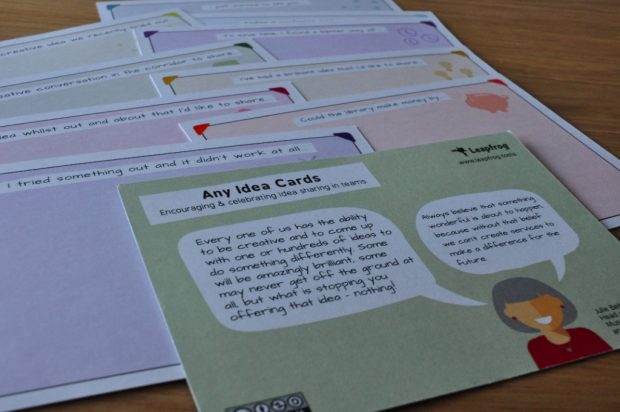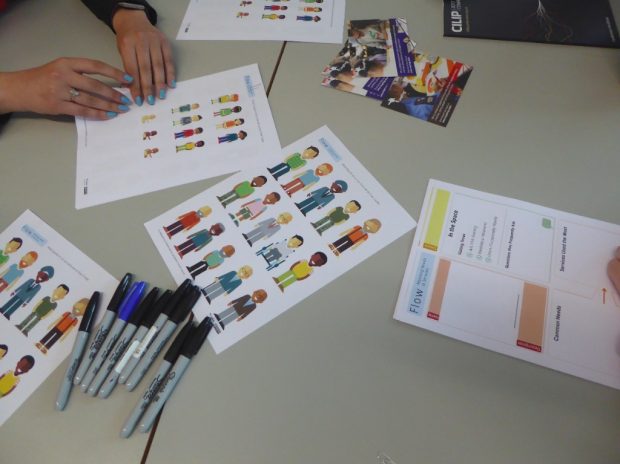[Editor’s note: Post written by Debbie Stubbs, project manager for Leapfrog, reporting on their work with Lancashire libraries around staff and community engagement. Libraries note: funding is available for the next six months to run tool sharing workshops for groups.]
The Leapfrog Team set off to the CILIP 2017 conference in Manchester to share tools and stories of collaboration, and the positive impact witnessed across Lancashire libraries because of this work. Our new ‘Any Ideas Cards’ were hot off the press and so we took them as gifts for the delegates.

Background to the project
Our project principal investigator, Prof Leon Cruickshank, introduced Leapfrog. It’s a unique research partnership between Lancaster University and the Glasgow School of Art, funded for 3 years by AHRC creative communities programme. This has resulted in new collaborations with engagement professionals, health professionals, librarians, young people in care, and community members.
As part of this work 19 projects have been initiated across the North West of England, Scotland, and the Highlands and Islands. Through working with Lancashire libraries, positive research outcomes have included methods of co-designing ‘tools’, their use and adaptation, and benefits that resulted from them are innovative approaches to community engagement.
Working with Lancashire libraries
We went to the conference to inspire our audience through leading a participatory Creative Hub session. Our story begins in 2015 with meeting Julie Bell, Head of Libraries, Museums, Culture and Registrars for Lancashire County Council. Julie was responsible for 73 libraries across Lancashire, and was faced with the prospect of over a third of these libraries being closed. During a period of radical change and service transformation, libraries were also being required to incorporate a wider range of services eg youth services, asset and facilities management, wellbeing and early intervention teams. At this time Lancashire needed to focus upon its strengths within its teams, and faced with issues of staff motivation and positivity, they wanted to keep looking upwards.
Julie and over 20 library staff members worked for 9 months with the Leapfrog team - they collaborated and developed their own tools to confront and tackle the challenges they faced. Julie was determined, and with drive and passion, pushed them to look creatively at what they did and think ‘outside the bookmark’. Through ‘action research’ and a co-design process, everyone involved found themselves energised and approaching their work differently. The ‘action’ involved the whole team having equal input into building new engagement tools. These new engagement tools are now freely available for other librarians, and organisations far and wide, to download, use, and modify for their own benefit.
The tools developed by the project
For the CILIP interactive session, Leapfrog’s research associate, Laura Wearing, promoted the tools for teams to work collectively in groups of eight, trying them out in their own way. The groups gave feedback on each tool they used:
Communications stretcher and communications focus tool: used for stretching your whole communication language. The tools helped librarians identify and map new ways of reaching and working with communities whilst operating within a newly formed team (for this exercise they had been together for 10 minutes and teamwork was strong!).

Customer needs. This tool aims to prompt communications and helps profile, pinpoint and signpost customers (library users in this case) to the right resource or place. Delegates found that they were able to readily work as a ‘new library team’ and quickly understood and matched customer needs across a large range of services on offer. All eight teams used the tool in different ways including: ‘examining our regular users and people we would like to see more in libraries’. Feedback given proved ‘it was a good tool for different backgrounds and for us collaboratively to share across our areas of expertise’.
Personas. These tools were found to be useful in identifying crossovers and improving communications for regular library users and non-users.
‘In examining our users: we chose a baby who would want our space to be accessible, bright, filled with information and to inspire confidence, and a care leaver as an occasional user who may need a computer, information on IT and jobs, while also needing accessible space and confidence.’ (Workshop participant)
The workshop group indicated new ways in which they would use the tools themselves: ‘Tools can be combined and adapted, we can gain information that may challenge our presumptions of what people are like, library users could also use the tools themselves, so staff can be directly aware of their needs or challenges, and then update information.’

Julie explained how her team were changing their daily practices and outlined how the complete set of library tools was building success and momentum across the county. Her particular favourite tools are:
- The small things – helping resolve simple conflicts; who buys the milk and who tidies up, ‘it’s a light-hearted way of keeping communications open to generate a positive domino effect, prompt people to do certain tasks, and share quick feedback to people who may not necessarily be there at the same time as you’.
- Think outside – a bookmark devised as a reminder to let creative juices flow; encouraging librarians to step outside at break-times to keep themselves refreshed and inspired.
- Flip – provides templates to create interesting opposites, to inspire a play on words about specific themes or topics that are currently taking place in the library.
A reminder: how to access the tools
Leapfrog partners and hundreds of associated organisations are now delving into the full range of over 30 different free tools, and building up their own ‘toolboxes’. Toolboxes are collated under different themes: supporting engagement in working with young people, helping work to develop teams, encouraging good practices for reaching remote communities, and providing stimulus for effective report writing. We hope you will delve in, download, and find them useful too!
If you are interested in collaborating or knowing more about the project, please get in touch quickly with Debbie, as we have funding available for the next 6 months to run tool sharing workshops for groups, and would be keen for you to benefit from our research work. You can contact her by email d.stubbs@lancaster.ac.uk or phone: Tel: (01524 5) 10893
Follow @leapfrogtools on twitter to hear their news, or keep an eye on their website: http://leapfrog.tools/
--------------------------------------------------------
Please note, this is a guest blog. Views expressed here do not necessarily represent the views of DCMS or the Libraries Taskforce